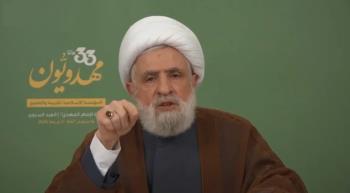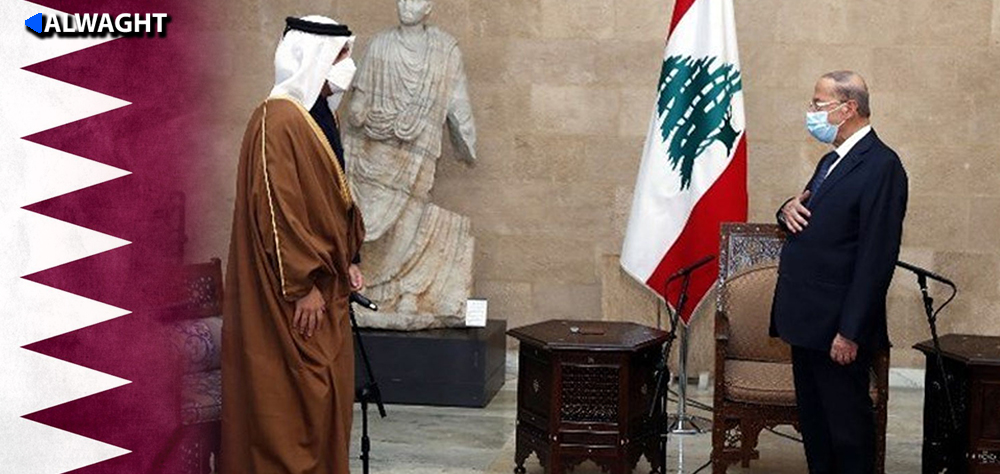Alwaght- As deep political divisions prevent formation of a government in Lebanon for several months now, on Tuesday Qatari’s Deputy Prime Minister and Foreign Minister Sheikh Mohammed bin Abdurrahman Al Thani in a Beirut visit expressed his country’s readiness to expand support to Lebanon through involvement in reconstruction projects under the condition of forming a new government.
But what is driving Qatar to make such a proposal? And what effects could Doha role leave on the Lebanese crisis-ravaged political scene?
Persian Gulf Arab states vying in Lebanon
The traces of Qatar's rivalry and political and ideological differences with Saudi Arabia and the UAE in the (Persian) Gulf Cooperation Council can be seen in most important regional cases, in which the two sides are present to build influence and impact the developments. In fact, it can be said that Qatar's role in the developments in Lebanon is in conflict with the type of activism and policy the Saudis are pursuing in the country.
The Saudi interventionist and authoritarian approach to Lebanon, especially under the Crown Prince Mohammed bin Salman, in addition to creating a crisis and paving the way for the continuation of crises, has backfired and left the necessary vacuum for Qatar to act. Moreover, the Qatari FM's visit coincides with the return of Saudi Ambassador to Lebanon Walid Bukhari, after more than three months of absence, which is a source of speculation.
Saudi Arabia has traditionally played the role of an Arab sponsor in Lebanon, but in 2016, Riyadh suspended a promised $3 billion aid package to pressure the Lebanese government not to cooperate with Hezbollah. When PM Saad Hariri was detained during a visit to Riyadh in late 2017 and forced to resign, the relations went even tenser.
As the Qatari-Saudi competition continues, Doha’s role in Lebanon will enjoy support from Turkey, as a regional rival to Saudi Arabia, to cut the Saudi influence among the Lebanese Sunnis.
This rivalry has intensified since 2017, the year Saudi Arabia, along with the three countries of the UAE, Egypt and Bahrain, decided to impose a blockade on Qatar and sever ties with it. In step to checkmate the Saudi-imposed isolation and break the blockade, Qatar established strong ties with such countries as Iran, Iraq, Jordan, and Lebanon.
From another dimension, Qatar's role in Lebanon can be traced back to the country’s general policy of mediating and facilitating stability and peace in the region to increase regional and international prestige. Other examples include support to the besieged Gaza, the Afghan peace, the Ethiopian-Sudanese dispute, and even the declaration of willingness to mediate between Tehran and Riyadh.
Qatar role potentials
Qatar’s push for playing a role in Lebanon is far from new. In 2008, the Persian Gulf emirate arranged a meeting to patch up various Lebanese political groups’ relations. The outcome was selection of Michel Sleiman, a former army general, as president and end of the months-long political limbo.
Also, in January 2019, Doha bought Lebanon bonds for $500 million, a move made to show good will to Beirut while both Riyadh and Abu Dhabi at the height of the economic crisis were indifferent in an apparent failure to commit to their promises. Since summer of 2019, Lebanon has been grappling with its worst financial crisis, with national currency, pound, losing 80 percent of its value against the US dollar, the job market experiencing biggest losses, and inflation skyrocketing. Qatari Emir Sheikh Tamim bin Hamad Al Thani was the only Arab leader to attend Beirut’s Arab economic summit in January 2019 while other Arab leaders boycotted it.
In fact, the severe financial crisis in Lebanon, which has been a major catalyst to the protests and the political crisis of the past year, has made Beirut in dire need of foreign economic assistance. Meanwhile, the French-led foreign bloc tied international aids delivery to government formation and the implementation of economic reforms, something far from materialization with Hariri faction's insistence on forming a technocratic government and external pressures from Saudi Arabia and the US.
Meanwhile, for a bigger influence, Qatar has tied its aid program to formation of a new cabinet.
“We had a message [to deliver], to persuade all parties to put the national interests before the political interests for government formation,” the top Qatari diplomat told the press at Lebanese presidential palace.
He further told the journalists: “Our policy is to give financial support only through economic projects.” He added that his country’s involvement in Lebanon aid is not contrary to the French initiative. “We are not seeking to undermine the French initiative. Rather, we are trying to stand a complement to the international efforts towards a new Lebanese government formation,” he went on.
From a different aspect, Qatar’s initiative is welcomed by President Michel Aoun and Hezbollah, which means Doha would observe increased power of mediation in Lebanon’s developments.



























